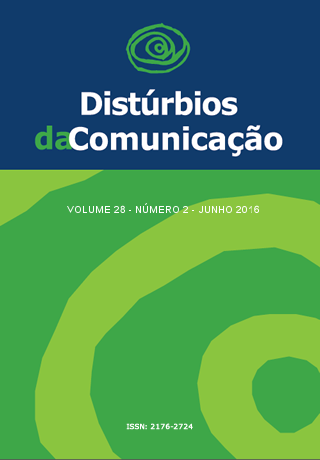Alternative processes of meaning and jargonaphasia: a case study
Keywords:
Aphasia, Language, Speech therapy.Abstract
Introduction: Aphasias are changes of expression and/or understanding of verbal language (oral and written) that can be treated by speech therapy. Objective: To identify and analyze verbal and non-verbal production (alternative processes of meaning) of an individual supervised in speech therapy and an Interdisciplinary Support Group. The analysis of production/interpretation of verbal and non-verbal language was performed from excerpts produced through dialogical relations in individual therapy sessions and in the support group. Method: Data collection occurred over the years 2013 and 2014, through filming of individual speech therapy sessions and the Interdisciplinary Support Group. The individual is male, born in the state of Rio Grande do Sul, 61 years old, environmental technician at the Brazilian Institute of Environment; he suffered an ischemic stroke in the left cerebral hemisphere, in May 2010. The perspective of Discursive Neurolinguistics is the basis for interpretation of linguistic and cognitive data of the individual. Results: we verified different meaning processes (alternative or not) manifested by the individual during the therapies and/or experiences in the group, especially the concomitant use of gestures and speech and the use of gestures, drawings and writing instead of speech. Conclusion: This individual, clinically monitored, according to the aforementioned perspective, has demonstrated potential for expression and understanding, whereas processes – therapeutic and in the support group – favor verbal production/interpretation as well as the nonverbal/alternative processes of meaning attribution.
Downloads
Metrics
Downloads
Published
Issue
Section
License
Copyright (c) 2016 Aline Sarturi Ponte, Eduarda Pazini, Vanessa Inês Klein Feltes, Elenir Fedosse

This work is licensed under a Creative Commons Attribution 4.0 International License.









